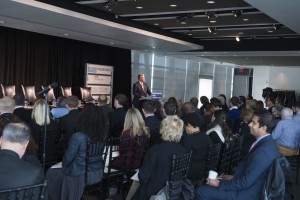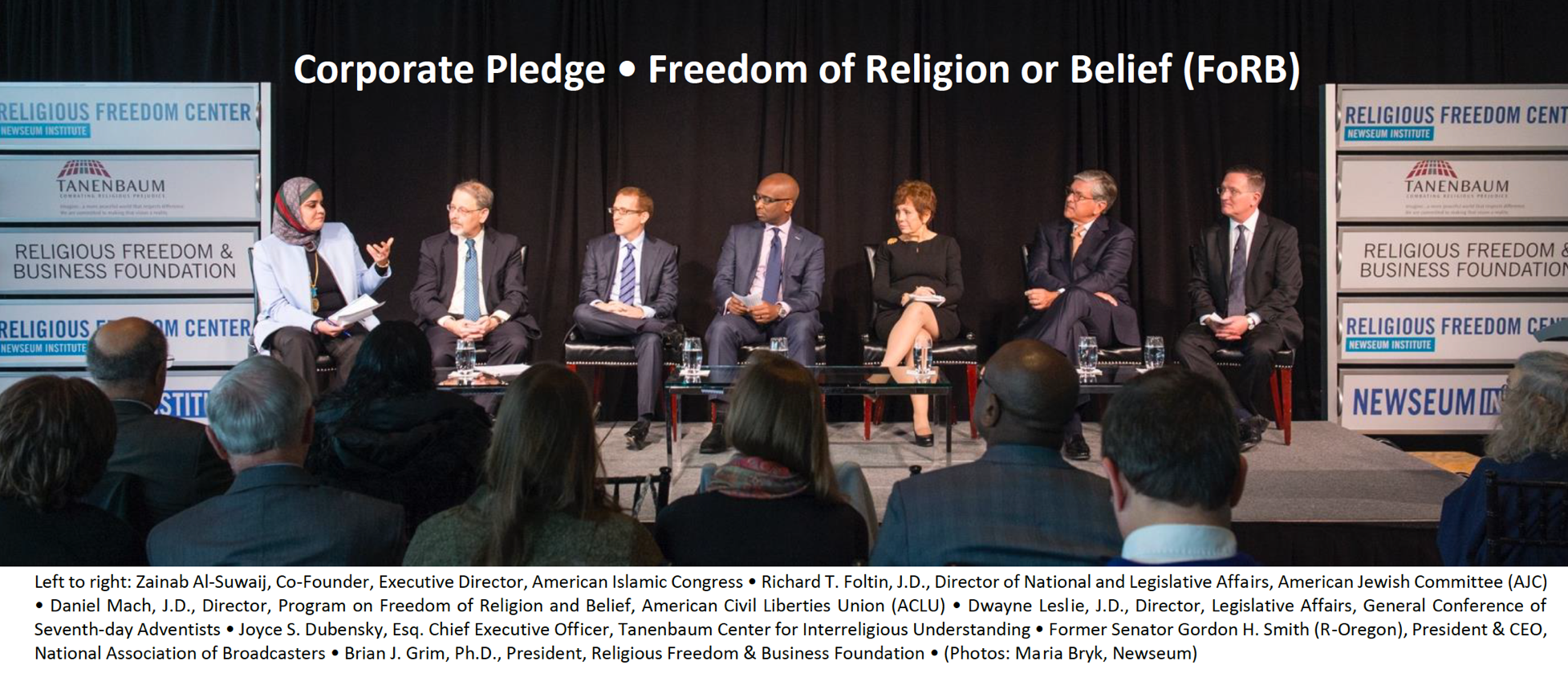 Brian Grim will present the following at a Brigham Young University on July 6, 2017.
Brian Grim will present the following at a Brigham Young University on July 6, 2017.
Recently, my colleague from Georgetown University’s School of Management, Paul Lambert, and I made the case for why religious freedom is good for business at the Utah World Trade Center. With his permission, I’ll begin by summarizing six points he made:
1. Globalizing World: The world is becoming more religious (Pew expects 80% of world population will consider itself religious by 2050). Secularization theory isn’t right on this. In order to connect with critical stakeholders in a globalized marketplace, religion must be taken into account. This includes recruiting the most talented workforce (many of which come from very religious countries), connecting with customers in religious areas, etc. Think of the tech industry that increasingly built upon the skills of young 25 to 35 year-old Muslims and Hindus.
2. Young talent is increasingly attracted to companies with a “great place to work” reputation. Businesses receive such a distinction in large part for their policies around work-life balance, personal life accommodation (including religion), environment, etc. With an increasingly diverse religious demographic, businesses must build an environment where religious diversity is welcome.
3. Diversity, including religious diversity, increases factors that lead to business success, such as innovation. I am citing your study here: Brian Grim, Greg Clark, Robert Snyder, “Is Religious Freedom Good for Business?: A Conceptual and Empirical Analysis,” Interdisciplinary Journal of Research on Religion, Vol. 10 (2014).
4. Practical and prudent in today’s world. Having policies that embrace religious diversity and create religious accommodation help businesses avoid workplace discrimination, harassment and eventual legal trouble that follows. (Abercrombie case)
5. Religious freedom is associated with greater economic stability and created an environment for economic stability. Economic stability leads to economic prosperity, which leads to increased investment and further business opportunities.
6. Religious freedom is part of the greater trend for equal rights for all. The timing is right for business to act.
Indeed, Freedom of Religion or Belief is an internationally recognized human right. Article 18 of the United Nations Universal Declaration of Human Rights states:
Everyone has the right to freedom of thought, conscience and religion; this right includes freedom to change his religion or belief, and freedom, either alone or in community with others and in public or private, to manifest his religion or belief in teaching, practice, worship and observance.
However, 36% of American workers report experiencing or witnessing workplace religious discrimination, according to a recent Tanenbaum survey, “What American Workers Really Think about Religion.”
The most successful businesses encourage an environment in which employees can bring their “full self” to work. Employees need to feel comfortable being who they are in the workplace, including being true to their core identity and beliefs. That includes recognizing and respecting an employee’s religion and its practice.
In today’s increasingly more competitive business environment, companies will need to draw upon the talent and experience of every employee. They can’t afford to leave anyone out. If they exclude or alienate someone for reasons having nothing to do with a person’s ability to do the job, they might also be excluding the next great business solution or the next great product idea. The very thing a company might need for its success. At the very least, they’ll be missing out on lots of really great talent.
And as companies become increasingly more global, they’ll need employees who reflect the increasing diversity of their customers. They’ll need employees who can relate to the daily experience of customers and who can see the customer point of view. For potentially billions of customers, religious belief and practice are a part of daily life. Having employees who understand that will not only help companies avoid costly missteps, it will also help companies develop products and services better tailed to customer needs. That’s an essential part of being competitive.
The Corporate Pledge
The Religious Freedom & Business Foundation provides a resource to help businesses respect and therefore advance religious freedom: The Corporate Pledge on Freedom of Religion or Belief (FoRB).
The Corporate Pledge in Support of Freedom of Religion or Belief (FoRB) — which supports religious diversity and freedom in the workplace — sends two clear messages to current and prospective employees: (1) You can work here without changing who you are; and (2) the company respects all employees and will not favor certain employees over others … and that’s good for the business of all.
The FoRB Pledge is one component of a company’s overall strategy to value its employees and increase their loyalty for the benefit of customers and shareholders. The FoRB Pledge is a company’s public commitment to take reasonable steps to ensure that working at the company does not put employees at odds with their deeply held religious convictions.
Supporting Resources:
These documents offer templates and sample language that businesses can use to ensure that freedom of religion or belief (FoRB) is respected by the company in its external and internal dealings.
The sample corporate documents include:
- – Corporate Charter Statements
- – Employee Policy
- – External Policies
- – Corporate Pledge
- – Best Practices
- – Appendix: Draft resolutions of the governing body to approve changes to corporate charters
You can download a non-logo “Company version” of the following PowerPoint for use in your own presentations.
You can insert your own company logo in the top right of each slide.
The FoRB Pledge – Company version
THE FORB PLEDGE
(1) Promoting Sustainable and Innovative Business Through Protecting Freedom of Religion or Belief
[COMPANY] affirms that freedom of religion or belief (“FoRB”) is a fundamental right.* [COMPANY] also recognizes that religious freedom promotes sustainable and innovative businesses, contributes to human flourishing, and results in peaceful and stable societies. For these reasons, and with a vision of a future of innovative and sustainable economies where FoRB and diversity are respected, [COMPANY] strives to be a leader in promoting and protecting FoRB in its workplace and communities. [COMPANY] will not tolerate abuses of religious freedom within its sphere of influence.
(2) Non-Discrimination and Non-Harassment on the Basis of Religion or Belief
[COMPANY] respects each individual’s rights to freedom of religion or belief, provides equal employment opportunities to all employees and prohibits discrimination on the basis of religion or belief. This prohibition on religious discrimination applies to all aspects of employment including, without limitation, recruitment, interviewing, hiring, training, job assignments, promotions, demotions, compensation, benefits, transfers, terminations. [COMPANY] will take appropriate action upon receiving a report consistent with its general non-harassment and non-discrimination policy.
(3) Religious Accommodation and Inclusion
[COMPANY] promotes a religiously inclusive environment where each employee’s beliefs are recognized and respected, but where religion or belief is not a matter of force or coercion. Consistent with this policy, an employee may seek, and [COMPANY] will provide, a reasonable religious accommodation that does not create an undue hardship on [COMPANY]’s business if his or her religious beliefs, observances, practices, or requirements conflict with his or her job, work schedule, [COMPANY]’s policy or practice on dress and appearance, or with other aspects of employment.
(4) Protecting and Promoting Freedom of Religion or Belief (FoRB) in Our Communities
[COMPANY] strives to be a leader in promoting and protecting freedom of religion or belief (FoRB) among its stakeholders and in the broader community. [COMPANY] gives priority to business partners, suppliers, and contractors who share [COMPANY]’s values, including FoRB. [COMPANY] supports their efforts to promote these values through their business activities. Among other practices that are consistent with this policy, [COMPANY] will strive to support local, national and global initiatives that promote FoRB, and may refrain from doing business with or investing in companies and governments that restrict FoRB.
[SIGNATURE & COMPANY DETAILS]
CEO of the National Association of Broadcasters, Senator Gordon H. Smith, gave the keynote at the Washington DC Jan. 12th launch of the Religious Freedom & Business Foundation’s Corporate Pledge (photos by Maria Byrk/Newseum Institute).
- — For a news summary of the event, see article by Nate Madden.
- — See the global history of the corporate pledge.
The Religious Freedom & Business Foundation co-hosted this event with the Newseum Institute’s Religious Freedom Center and the Tanenbaum Center for Interreligious Understanding in anticipation of the President’s annual declaration of January 16th as Religious Freedom Day, calling upon Americans to observe this day through appropriate events and activities.
High level panelists* discussed how businesses can successfully negotiate religious freedom and workplace issues. In an era when millennials are especially concerned for fairness and equality for all, respecting the religion and beliefs of employees is not only fair and good policy, but is also good for business.
 At the event, CEOs, representatives of major companies, heads of trade and commerce organizations, and the media were introduced to a nonpartisan corporate pledge on religious nondiscrimination and inclusion in the workplace. This new resource and its associated resource documents will align with core American values of religious freedom while creating a more inclusive work environment that leverages religious diversity.
At the event, CEOs, representatives of major companies, heads of trade and commerce organizations, and the media were introduced to a nonpartisan corporate pledge on religious nondiscrimination and inclusion in the workplace. This new resource and its associated resource documents will align with core American values of religious freedom while creating a more inclusive work environment that leverages religious diversity.
*Other speakers included Joyce S. Dubensky, Esq., CEO, Tanenbaum; Richard T. Foltin, Director, National and Legislative Affairs in American Jewish Committee’s Office of Government and International Affairs; Charles C. Haynes, Vice President Newseum Institute / Religious Freedom Center and a senior scholar at the First Amendment Center; Dwayne Leslie, Associate Director in the Department of Public Affairs and Religious Liberty and Director of Legislative Affairs for the General Conference of Seventh-day Adventists; Daniel Mach, Director, ACLU Program on Freedom of Religion and Belief; and Zainab Al-Suwaij, Executive Director and a co-founder of the American Islamic Congress (AIC).

